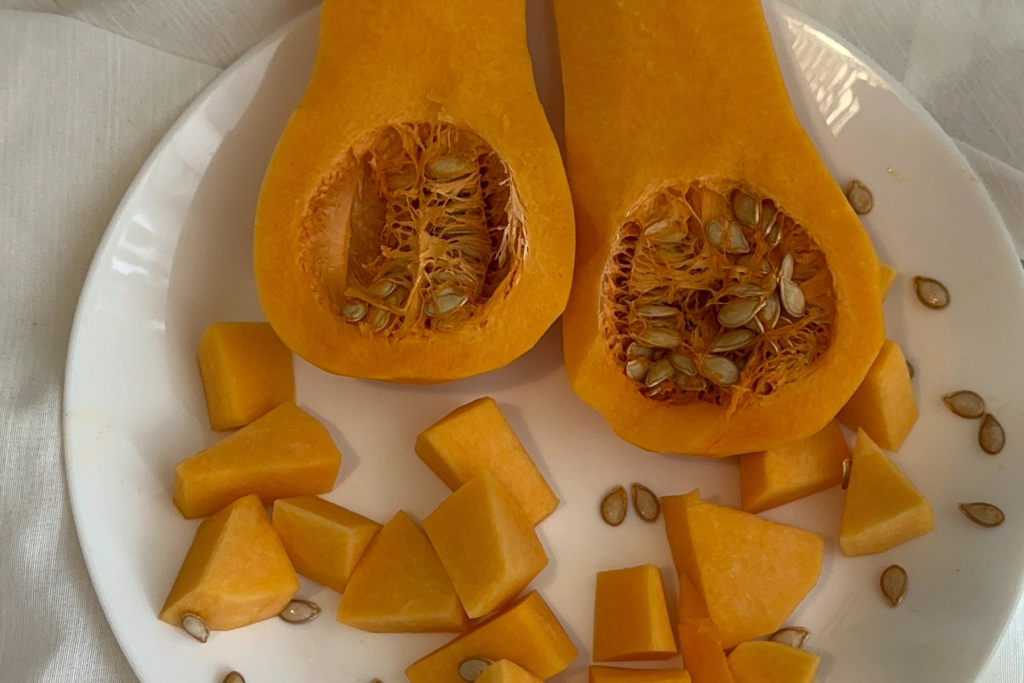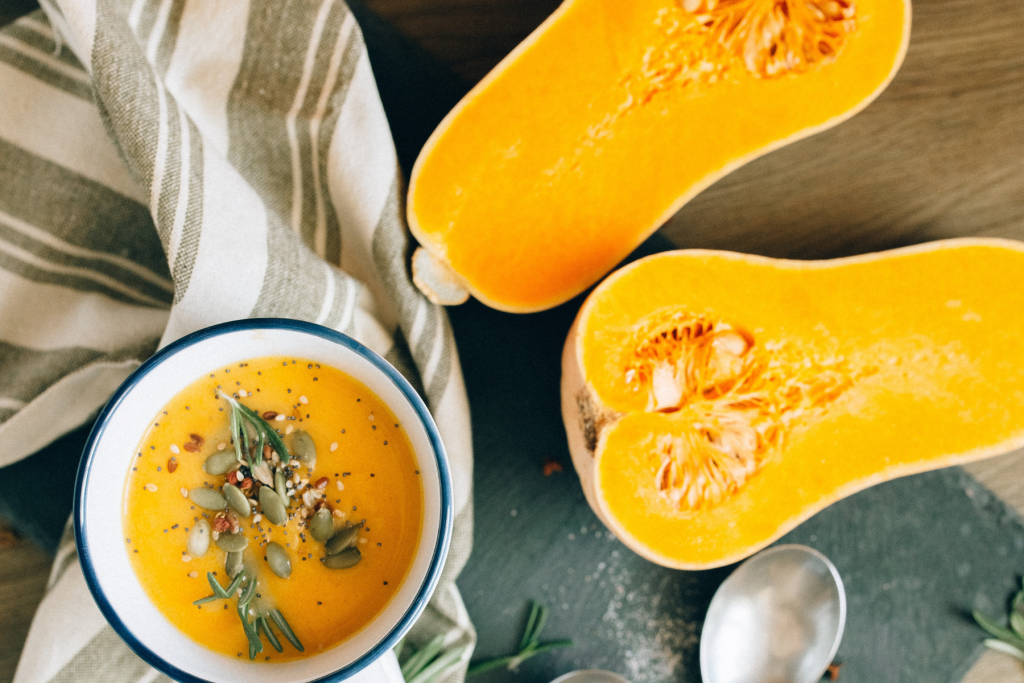Learn about the incredible benefits of incorporating pumpkin seeds into your diet.
Discover the Benefits of Pumpkin Seeds in Your Diet
Fall is in the air, and you know what that means – pumpkin season is here! While pumpkins are popular for carving and decorating, their seeds often go unnoticed. But did you know that pumpkin seeds are not just a tasty snack, but also a superfood packed with incredible health benefits? Let’s dive into the world of pumpkin seeds and uncover their nutritional profile, health benefits, and delicious ways to incorporate them into your meals.
Understanding the Nutritional Profile of Pumpkin Seeds

Before we talk about the benefits, let’s explore the nutritional wonders that make pumpkin seeds a powerhouse. These tiny seeds are loaded with vitamins, minerals, protein, and fiber, making them a nutrient-rich addition to any diet.
Pumpkin seeds are not only delicious but also packed with a wide array of vitamins and minerals that are essential for maintaining good health. One of the standout nutrients found in pumpkin seeds is vitamin E, a powerful antioxidant that helps protect cells from damage caused by free radicals. Additionally, these seeds are a great source of magnesium, a mineral that plays a crucial role in over 300 biochemical reactions in the body, including energy production, muscle function, and bone health. Zinc is another mineral abundant in pumpkin seeds, which is important for immune function, wound healing, and DNA synthesis.
But the nutritional benefits of pumpkin seeds don’t stop there. These little powerhouses also contain iron, an essential mineral that helps transport oxygen throughout the body and is necessary for the production of red blood cells. Copper, another mineral found in pumpkin seeds, is involved in the production of collagen, a protein that supports healthy skin, bones, and connective tissues. Manganese, yet another mineral present in these seeds, is important for metabolism, bone formation, and antioxidant defense.
Vitamins and Minerals in Pumpkin Seeds
Pumpkin seeds are a goldmine of vitamins and minerals. From immune-boosting vitamin E to bone-strengthening magnesium and zinc, these seeds have it all. Additionally, they contain iron, copper, and manganese, which are essential for various bodily functions.
When it comes to protein and fiber content, pumpkin seeds are a standout. These little wonders are not only a great source of plant-based protein but also offer a generous dose of dietary fiber. Protein is essential for building and repairing tissues in the body, making pumpkin seeds an excellent option for vegetarians and vegans looking to meet their protein needs. The fiber content in pumpkin seeds aids in digestion, promotes a healthy gut, and helps regulate blood sugar levels.
Protein and Fiber Content of Pumpkin Seeds
Looking for a plant-based protein source? Pumpkin seeds are your answer. These little wonders are packed with protein, which helps build and repair tissues in your body. They also offer a generous dose of dietary fiber, aiding in digestion and promoting a healthy gut.
Now, let’s talk about the healthy fats found in pumpkin seeds. While the word “fats” may sound scary, it’s important to note that not all fats are created equal. Pumpkin seeds are a source of healthy fats that your body needs. They are rich in monounsaturated and polyunsaturated fats, including omega-3 and omega-6 fatty acids. These fats are known to support heart health, reduce bad cholesterol levels, and may help reduce inflammation in the body. Incorporating pumpkin seeds into your diet can be a delicious way to add these beneficial fats to your daily intake.
Healthy Fats in Pumpkin Seeds
While the word “fats” may sound scary, pumpkin seeds are a source of healthy fats that your body needs. They are rich in monounsaturated and polyunsaturated fats, including omega-3 and omega-6 fatty acids, which support heart health and may help reduce inflammation in the body.
In conclusion, pumpkin seeds are not only a tasty snack but also a nutritional powerhouse. They are packed with vitamins, minerals, protein, and healthy fats that offer a wide range of health benefits. Whether you sprinkle them on salads, blend them into smoothies, or enjoy them as a standalone snack, incorporating pumpkin seeds into your diet is a simple and delicious way to boost your nutrient intake and support overall well-being.
Health Benefits of Incorporating Pumpkin Seeds into Your Diet
Now that we know what pumpkin seeds are made of, let’s unveil the fantastic health benefits they offer.
Pumpkin seeds, also known as pepitas, are not only delicious but also packed with nutrients that can greatly benefit your overall health. These small, green seeds are a powerhouse of vitamins, minerals, and antioxidants, making them an excellent addition to your diet.
Boosting Heart Health with Pumpkin Seeds
Your heart is the unsung hero of your body, tirelessly pumping blood to keep you alive and thriving. And guess what? Pumpkin seeds are its biggest fan. These seeds are rich in antioxidants, such as vitamin E and carotenoids, which can help reduce the risk of cardiovascular diseases.
Additionally, pumpkin seeds are a great source of healthy fats, including omega-3 fatty acids and monounsaturated fats. These fats have been shown to lower bad cholesterol levels, improve blood pressure, and reduce inflammation in the body. By incorporating pumpkin seeds into your diet, you can give your heart some love and support its optimal functioning.
Pumpkin Seeds and Blood Sugar Regulation
Are you looking to keep your blood sugar levels in check? Pumpkin seeds might be just what you need. Their high fiber content slows down digestion and helps prevent blood sugar spikes, making them a diabetic-friendly snack option.
Fiber plays a crucial role in regulating blood sugar levels by slowing the absorption of glucose in the bloodstream. This can help prevent sudden spikes and crashes in blood sugar, providing a steady and sustained release of energy. By including pumpkin seeds in your meals or enjoying them as a snack, you can maintain stable blood sugar levels and support your overall well-being.
The Role of Pumpkin Seeds in Bone Health
Strong bones are the foundation of a healthy body, and pumpkin seeds can lend a helping hand. Thanks to their impressive mineral content, including magnesium, zinc, and phosphorus, these seeds support bone density and can help reduce the risk of osteoporosis.
Magnesium is essential for bone formation and maintenance, as it helps regulate calcium levels in the body. Zinc plays a vital role in collagen synthesis, which is necessary for bone strength and flexibility. Phosphorus, on the other hand, contributes to the structural integrity of bones and teeth. By incorporating pumpkin seeds into your diet, you can provide your body with these essential minerals and promote optimal bone health.
In addition to their mineral content, pumpkin seeds also contain plant compounds called phytosterols. These compounds have been shown to have anti-inflammatory properties, which can further support bone health by reducing the risk of chronic inflammation and associated bone loss.
So, whether you sprinkle them on salads, blend them into smoothies, or enjoy them as a crunchy snack, pumpkin seeds are a delicious and nutritious way to enhance your diet and reap their numerous health benefits.
Delicious Ways to Include Pumpkin Seeds in Your Meals
Now that we’ve established the countless benefits, let’s explore some creative ways to incorporate these mighty seeds into your meals.
Adding Pumpkin Seeds to Your Breakfast
Start your day off right by sprinkling some pumpkin seeds on your morning granola or oatmeal. You’ll add a delightful crunch while providing your body with a boost of nutrients to kickstart your day.
Incorporating Pumpkin Seeds into Your Lunch and Dinner
Pumpkin seeds are incredibly versatile and can be incorporated into a variety of recipes. Toss them into your salads, sprinkle them over roasted vegetables, or use them as a tasty crust for baked chicken or fish. The possibilities are endless!

Snacking on Pumpkin Seeds
When the mid-afternoon munchies strike, skip the sugary snacks and opt for a handful of pumpkin seeds instead. They make an excellent on-the-go snack, providing a satisfying crunch and a dose of nutrients to keep you energized throughout the day.
Potential Side Effects and Considerations
While pumpkin seeds are generally safe for most people, it’s essential to be aware of potential allergies, dietary restrictions, and interactions with medications.
When it comes to allergies and intolerances, it’s important to note that pumpkin seeds can cause adverse reactions in individuals with a seed allergy or intolerance. Symptoms may include itching, swelling, hives, or difficulty breathing. If you have any concerns about consuming pumpkin seeds, it’s always best to consult with a healthcare professional before adding them to your diet.
In addition to allergies, individuals who follow specific dietary plans need to consider the sodium and oxalate content in pumpkin seeds. For those on a low-sodium diet, it’s important to note that pumpkin seeds can be relatively high in sodium. While they are a nutritious snack, it’s best to check with your dietitian or healthcare provider to ensure they align with your dietary needs.
Similarly, individuals following a low-oxalate diet should be aware that pumpkin seeds contain oxalates, which can contribute to the formation of kidney stones in susceptible individuals. If you have a history of kidney stones or are following a low-oxalate diet, it’s advisable to consult with your healthcare provider before incorporating pumpkin seeds into your meals.
Furthermore, if you’re currently taking any medications, it’s always wise to double-check for potential interactions with pumpkin seeds. While uncommon, certain compounds found in pumpkin seeds may interact with specific medications, affecting their efficacy or causing unwanted side effects. To ensure your safety, it’s best to consult your healthcare provider for personalized advice regarding the consumption of pumpkin seeds while on medication.
Despite these considerations, incorporating pumpkin seeds into your diet can be a simple and delicious way to boost your nutrition and reap the numerous health benefits they offer. Pumpkin seeds are rich in essential nutrients such as magnesium, zinc, and omega-3 fatty acids, which can support heart health, improve immune function, and promote healthy skin.
Moreover, pumpkin seeds are a great source of dietary fiber, which aids in digestion and helps maintain a healthy weight. The fiber content also contributes to a feeling of fullness, making pumpkin seeds a satisfying snack option.
Additionally, pumpkin seeds contain antioxidants, including vitamin E and carotenoids, which help protect the body against oxidative stress and reduce the risk of chronic diseases such as heart disease and certain types of cancer.
So, why not embrace the season and add these tiny powerhouses to your meals? Whether you sprinkle them on salads, blend them into smoothies, or use them as a topping for roasted vegetables, pumpkin seeds can add a delightful crunch and a nutritional boost to your favorite dishes. Your taste buds and your body will thank you!







